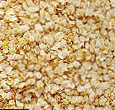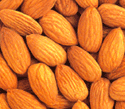Live Well, Eat Whole
An introduction to whole foods and nutrition by Jan Ridgely
 |
Whole Grains, Beans, |
 |
Whole Grains
This is a vitally important category in maintaining health. Whole grains mean just that. It's the plant in its entirety.
White flour, white rice and white pasta are not whole grains; they have been stripped of some of the most important nutrients. Namely, whole grains provide vitamin E, B vitamins and vital minerals such as magnesium, calcium and zinc. These nutrients are vital for building bone, clearing arteries and attacking malignant cells. There's fiber and bulk to cleanse the intestinal track. Processed wheat products have little or no fiber, minerals and vitamins and increased concentrations of salt and fat.
Examples of whole grains include buckwheat or kasha, millet, quinoa, brown rice and spelt and kamut. All of these grains are easily cooked using water and a pinch of salt.
Beans
Beans are a wonderful substitute for meat. They're loaded with protein, fiber, low in calories, high in calcium and iron. There are so many varieties, shapes and sizes. This is a wonderful season for using beans in soups and stews. Many varieties don't require soaking-lentils, black-eyed peas, split peas to name a few. I use a pressure cooker nearly every day, which greatly decreases cooking time and increases ease. I can make a beautiful curry or lentil stew in about 20 minutes!
Nuts and Seeds
In our thinness crazed society, nuts and seeds are often overlooked as fatty foods. This is not the case. More and more research points to the importance of fats-especially fats from vegetable sources. Nuts and seeds provide that essential fat which has actually been shown to help clear arteries of "bad" fats, as well as help metabolize fats in the body. Ironically you need fats to lose fat! Some nutrition power packs include pumpkin seeds-loaded with zinc; and almonds loaded with calcium.
© Jan Ridgely, MS Nutrition and Peak of Health 2002